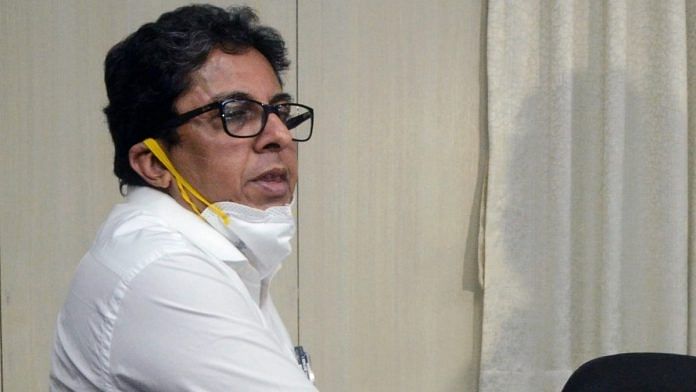New Delhi: In an unprecedented move, the central government Friday recalled West Bengal Chief Secretary Alapan Bandyopadhyay, hours after a row broke out between the Narendra Modi government and Chief Minister Mamata Banerjee over a review meeting on Cyclone Yaas.
Banerjee, along with Bandyopadhyay, did not attend the review meeting on Cyclone Yaas Friday, citing other appointments. She also made PM Modi wait for 30 minutes.
The Appointments Committee of the Cabinet (ACC) has “approved placement of the services of Alapan Bandyopadhyay, an IAS officer of 1987 batch, with the government of India, as per provisions of Rule 6(1) of the Indian Administrative Service (cadre) rules, 1954 with immediate effect,” the order, issued Friday, said.
“Accordingly, the State government is requested to relieve the officer with immediate effect and direct him to report to the Department of Personnel and Training, North Block, New Delhi by 10 am on May 31, 2021,” the order added.
The unprecedented nature of the senior-most IAS officer of a state government being summoned after a Centre-state conflict has triggered a debate within the IAS community over the powers of the state and the federal government regarding the bureaucracy.
Also read: ‘Shameful’: Union ministers launch coordinated Twitter attack on Mamata for making Modi wait
What do the rules on central deputation say?
According to Rule 6 (1) of the Indian Administrative Service (Cadre) Rules, 1954. “A cadre officer may, with the concurrence of the State Governments concerned and the Central Government, be deputed for service under the Central Government or another State Government or under a company, association or body of individuals, whether incorporated or not, which is wholly or substantially owned or controlled by the Central Government or by another State Government.”
It adds, “Provided that in case of any disagreement, the matter shall be decided by the Central Government and the State Government or State Governments concerned shall give effect to the decision of the Central Government.”
Explaining the rules, a senior IAS officer, who wished to remain unnamed, said: “This basically means that ordinarily speaking, for an officer to be placed on central deputation, the consent of both the Centre and the State is required – the state’s No Objection Certificate (NOC) is required for any officer to be sent to the Centre.”
“But if there is a disagreement of any kind, then as per the rules, the Centre’s will has to prevail,” the officer told ThePrint.
Also read: Under Modi govt, civil servants have lost initiative and drive. India is paying the price
What happens if officer does not comply with deputation orders?
While the rules state that the Centre’s will must prevail in matters of deputation in case there is a dispute with state governments, rules do not specify what happens in case the officer does not comply or the state government refuses to relieve the officer.
According to the All India Service (AIS) Rules, the Centre cannot take any disciplinary action against IAS, IPS or IFS officers posted in their state cadres.
According to Rule 7 of the All India Services (Discipline and Appeal) Rules, 1969, the “authority to institute proceedings and to impose penalty” will be the state government if the officer is “serving in connection with the affairs of a State, or is deputed for service under any company, association or body of individuals, whether incorporated or not, which is wholly or substantially owned or controlled by the Government of a State, or in a local authority set up by an Act of the Legislature of that State.”
Furthermore, government guidelines clearly state that in case of a disciplinary matter, the competent authority to suspend an IAS officer is the government in connection with whose affairs the officer is serving.
Speaking to ThePrint in a similar context, former DoPT secretary Satyanand Misra had said, “The rules say that the Centre has the final say, but it doesn’t specify what happens if the state still refuses to relieve a certain officer.”
A new low for freedom of civil servants, say officers
While this is the first time a sitting chief secretary has been summoned by the Centre in this fashion, just last year, the Modi government had summoned three IPS officers from West Bengal after yet another standoff.
The Ministry of Home Affairs (MHA) had summoned three officers, who were in-charge of BJP National President J.P. Nadda’s security when his convoy was attacked in December last year, for central deputation.
Not only did the Mamata Banerjee government not spare the officers for central deputation but also promoted two of them days later.
Back in 2001, the Centre had similarly summoned three IPS officers from Tamil Nadu, who had been allegedly involved in the raid on former chief minister M. Karunanidhi’s home, and his subsequent arrest along with two of his DMK colleagues, days after AIADMK’s J. Jayalalithaa came to power.
None of the three officers complied with the central deputation order.
“There may have been one-off cases before where an officer is summoned by the Centre, but by and large the accepted norm has been that you do not place an officer under forced deputation,” the officer quoted above said.
“And for this to happen to a sitting chief secretary is chilling for the whole civil services community…The politicisation and the political targeting of civil servants does not get more obvious than this,” he added.
Also read: How PM Modi pulled up IAS officers 3 times in 3 weeks for slow pace of work, lacking ‘courage’



